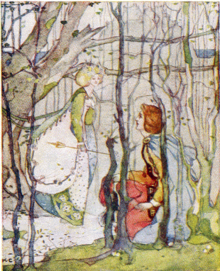Thomas the Rhymer
| Thomas the Rhymer | |
|---|---|

From Thomas the Rhymer (retold by Mary MacGregor, 1908) "Under the Eildon tree Thomas met the lady," illustration by Katherine Cameron
|
|
| Born |
Thomas de Ercildoun c. 1220 Erceldoune (Earlston), Berwickshire, Scotland |
| Died | c. 1298 (age about 78) |
| Nationality | Scottish |
| Other names | True Thomas, Thomas Learmonth/Learmount/Learmont/Learmounth, Thomas Rhymer/Rymour/Rymer, Thomas de Erceldoune/Ercildoun, Thomas Rymour de Erceldoune |
| Occupation | Laird |
| Known for | Prophecy |
| Children | Thomas de Ercildounson |
Thomas the Rhymer (fl. c. 1220 – 1298), also known as Thomas of Erceldoune, Thomas of Learmont or True Thomas, was a 13th-century Scottish laird and reputed prophet from Earlston (then called "Erceldoune") in the Borders. In literature he appears as the protagonist in the tale about Thomas the Rhymer, who was carried off by the "Queen of Elfland" and returned having gained the gift of prophecy, as well as the inability to tell a lie. The tale survives in a medieval verse romance in five manuscripts, as well as in the popular ballad "Thomas the Rhymer" (Child Ballad number 37). The original romance ca. 1400 was probably condensed into ballad form ca. 1700, though there are dissenting views on this.
Sir Walter Scott expanded the ballad into three parts, adding a sequel which incorporated the prophecies ascribed to Thomas, and an epilogue where Thomas is summoned back to Elfland after the appearance of a sign, in the form of the milk-white hart and . Numerous prose retellings of the tale of Thomas the Rhymer have been undertaken, and included in fairy tale or folk-tale anthologies; these often incorporate the return to Fairyland episode that Scott reported to have learned from local legend.
Sir Thomas was born in Erceldoune (also spelled Ercildoune – presently Earlston), Berwickshire, sometime in the 13th century, and has a reputation as the author of many prophetic verses. Little is known for certain of his life but two charters from 1260–80 and 1294 mention him, the latter referring to "Thomas de Ercildounson son and heir of Thome Rymour de Ercildoun".
Thomas became known as "True Thomas", supposedly because he could not tell a lie. Popular lore recounts how he prophesied many great events in Scottish history, including the death of Alexander III of Scotland.
Thomas' gift of prophecy is linked to his poetic ability. It is not clear if the name Rhymer was his actual surname or merely a sobriquet. He is often cited as the author of the English Sir Tristrem, a version of the Tristram legend, and some lines in Robert Mannyng's Chronicle may be the source of this association.
...
Wikipedia
